-
 Art of Wellness Acupuncture & Traditional Chinese Medicine (TCM)11704 Wilshire Blvd, Suite 295, Los Angeles, CA, 90025
Art of Wellness Acupuncture & Traditional Chinese Medicine (TCM)11704 Wilshire Blvd, Suite 295, Los Angeles, CA, 90025
myartofwellness@gmail.com310-451-5522 Office Hours
MonClosedTue7:30 am --4 pmWed7:30 am --4 pmThu7:30 am -- 4 pmFri7:30 am -- 4 pmSat7:30 am -- 4 pmSunClosedOur office opens from Tuesdays to Saturdays 7:30 am to 4 pm, will be closed on Memorial day, Independent day, Labor day, Thanksgiving day, Christmas and New year.
-
Recent Posts
- How to Treat Thoracic Outlet Syndrome With Acupuncture and TCM
- How to Treat Dupuytren’s Contracture With Acupuncture and TCM
- How to Treat Nutcracker Syndrome With Acupuncture and TCM
- How to Treat Rosacea With Acupuncture and TCM
- How to Treat Perioral Dermatitis With Acupuncture and TCM
- Lymphatic Drainage With Acupuncture and TCM
- How to Treat Turf Toe With Acupuncture
- How to Treat Nerve Pain With Acupuncture and TCM
- How to Treat Watery Eyes With Acupuncture and TCM
- How to Treat Ovarian Cysts With Acupuncture and TCM
- How to Treat Dystonia With Acupuncture and TCM
- Can Acupuncture Help Bad Breath?
- How to Treat Atopy with Acupuncture and TCM
- Plantar Fasciosis Treatment With Acupuncture and TCM
- How to Protect Yourself When Air Quality Is Poor
- How to Treat Spinal Headache With Acupuncture and TCM
- Sign up to receive news and updates and get my free report:“The Top 10 Reasons to Try Acupuncture”

August 2025 M T W T F S S 1 2 3 4 5 6 7 8 9 10 11 12 13 14 15 16 17 18 19 20 21 22 23 24 25 26 27 28 29 30 31
What We Treat
How to Treat PMS With Acupuncture and TCM
By Xiaomei Cai, L.Ac., Ph.D. & Qineng Tan, L.Ac., Ph.D.
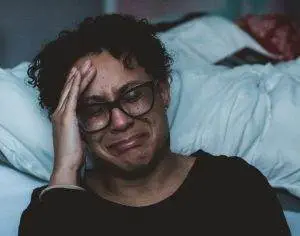
Monthly mood swings, bloated stomach, headaches, and weight gain. Why is PMS so bad? Premenstrual syndrome (PMS) is a set of symptoms that occur in the days before a woman gets her period. PMS symptoms affect every woman differently, and can be serious enough to disrupt your life every month. TCM is an effective way to deal with PMS, because acupuncture treatment can help relieve both physical and emotional symptoms of PMS and severe PMS, also known as PMDD (premenstrual dysphoric disorder).
To say that PMS is common among women is an understatement. The vast majority of women experience some changes in both their mental health and their bodies the week before their period starts. Whether or not a woman feels that it has a negative impact on her daily life may change over time. For some women, PMS isn’t a big deal; for others, it’s a major problem that can affect their relationships, impact their work, and make life hell every month.
Most women find their own particular pattern of PMS is somewhat predictable–until it isn’t. One of the most frustrating aspects of menstrual problems is the sense that things change without warning, and symptoms can come on suddenly with ferocious intensity. It can be difficult to describe how you feel before your period, because the symptoms seem to come and go. Some women find that their PMS symptoms are different from month to month. In some cases, they might find that every other month is bad, while the alternating months aren’t so bad. Why is PMS worse some months?
Other than the basic understanding that PMS is caused by fluctuations in hormones and brain chemistry, conventional medical science does not offer much in the way of clear answers about what causes PMS.
TCM provides a different framework for looking at menstrual problems and has been used to treat women’s health issues of all kinds for many centuries. TCM treatments including acupuncture, acupressure, moxibustion, and Chinese herbs can not only help relieve PMS symptoms, they can also be beneficial for other menstrual problems like irregular periods, PCOS, painful periods, endometriosis, heavy periods, fibroids, and symptoms of perimenopause.
Top 10 Symptoms of PMS
As a syndrome, PMS is considered a collection of symptoms that often appear together, in various combinations in different individuals. In the case of PMS, a woman may feel that her own symptoms change as often as every month, or gradually over the course of years. Girls in their teenage years may experience PMS in one way. Then, a woman in her early adult years may develop a different set of symptoms. After having a baby, a woman may find that her PMS symptoms have changed again. Then, many women in middle age experience changes in PMS symptoms as they go through perimenopause, approaching menopause. The most common signs of premenstrual syndrome include:
- Mood swings, low mood, feelings of sadness or anger
- Anxiety, feeling tense and irritable, cry easily or lose temper, want to be left alone
- Trouble sleeping, insomnia, disturbed sleep
- Breast tenderness, sore breasts, swollen breasts
- Food cravings, changes in appetite
- Weight gain, stomach bloating, water retention, pelvic pressure
- Gassiness, changes in digestion and elimination
- Acne, skin problems
- Changes in libido
- Headaches, migraines, difficulty concentrating, foggy head
Less obvious or well-known symptoms of PMS include: vision problems, tingling in the arms or legs, lack of coordination (clumsiness, dropping things), bruising easily, heart palpitations, dizziness, itchy skin, cold sores, toothaches, back pain, joint pain, and increased TMJ jaw pain.
Other health problems can be amplified during the premenstrual period, such as: chronic fatigue syndrome, fibromyalgia, interstitial cystitis, migraines, IBS, Meniere’s disease (dizziness, vertigo), clinical depression and anxiety disorders.
The physical and emotional aspects of PMS can affect each other, causing the typical mood swings. Feelings of sadness and frustration, or lack of sleep, may lead to comfort eating, but then the sight and sensation of your bloated stomach can cause you to feel depressed about your body. Minor problems with your spouse or co-workers can suddenly seem overwhelming and make you feel angry or helpless.
For some women, PMS symptoms are so bad that they feel unable to function the week before their period. Severe PMS is now diagnosed as PMDD.
What Is PMDD?
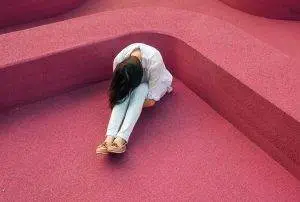
PMDD (premenstrual dysphoric disorder) is a severe form of PMS marked by intense emotional symptoms that dramatically impact a woman’s life, in addition to physical symptoms. “Dysphoria” is the opposite of “euphoria;” in other words, it is a mental state characterized by profound unhappiness and negative feelings. It is estimated that about 5% of all women experience this extreme type of PMS. Signs of PMDD include:
- Severe anxiety, panic attacks, paranoia
- Severe depression, in some cases even suicidal thoughts, lack of self-worth
- Anger and irritability that provokes rage and causes conflicts with other people
- Fatigue, low energy, inability to concentrate, feelings of confusion
- Intense food cravings, possibly leading to binge eating
Again, there is currently no scientific answer for what causes PMDD, although it is generally believed to be related to the way estrogen levels and progesterone levels change between ovulation and the onset of the menstrual period. Mood is considered to be related to serotonin levels in the brain, and this is why PMDD is usually treated with birth control pills, which suppress ovulation, and/or antidepressants (SSRIs), which affect serotonin uptake.
Medical Treatment for PMS
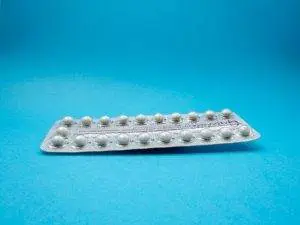
Naturally, when a woman asks for advice about PMS or PMDD, she is going to hear suggestions like: “try meditating, exercise more, eat a healthy diet, and get more sleep.” And it is true that making good lifestyle choices is an important part of helping to reduce PMS symptoms. But women who are suffering with serious PMS need solutions beyond these kinds of lifestyle guidelines.
When women complain of PMS symptoms, doctors will most often recommend OTC pain medications like ibuprofen or acetaminophen (NSAIDs) to relieve pain. Diuretics may be used to relieve bloating or premenstrual weight gain. Of course, most commonly, women are prescribed oral birth control pills, which suppress ovulation, and therefore may reduce the severity of PMS symptoms. More and more frequently, women may be prescribed antidepressants to try to deal with emotional symptoms and mood swings, or anxiety medications to take as needed during PMS. In effect, doctors often treat PMS the same way they would depression or anxiety.
Clearly, birth control pills are not helpful for women who may want to get pregnant, and some women may be concerned about how taking the pill or antidepressants may affect their fertility in the future. None of these pharmacological solutions for PMS address the root cause of the symptoms, and all of these medications carry side effects that may impact a woman’s overall health. Health care for women with TCM seeks to address the deeper internal causes of hormonal imbalances and other problems with the organ systems that are impacting the health of the ovaries and the regularity of the menstrual cycle.
Can Acupuncture Help PMS?

While it is only in recent years that conventional medicine has begun to acknowledge connections between physical health and emotional health, TCM has understood for many hundreds of years that health conditions of all kinds, especially those related to the menstrual cycle, are rooted in the balance of energies. Menstruation represents an ongoing process of transformation that occurs not only within the reproductive organs, but which affects every part of a woman, and even the people around her.
The concept of Yin and Yang in Chinese philosophy describes two opposing yet complementary forces that are constantly acting upon each other in order to achieve balance. The menstrual cycle is very much based on Yin and Yang energies; during the follicular phase of the cycle (before ovulation), Yin is increasing while Yang is decreasing, and in the luteal phase (after ovulation, before the period), Yang is increasing while Yin is decreasing. The system is designed, naturally, to create the right conditions for conception; this process of Yin and Yang exchange is what determines a woman’s fertility.
While the health of the uterus and ovaries is definitely central to the process, within the TCM philosophy, they are not the only organs involved with menstruation. The Kidneys, Liver, and Heart all have important roles to play, as well. In TCM, we also view the elements of Fire–to provide warmth, controlled by the Heart–and Water, controlled by the Kidneys–to provide moisture, as being vital to all processes within the body, especially to menstruation. Blood is cleansed, stored, and then distributed to the other organs by the Liver. Blood being central to the process of menstruation, the Liver’s role is really key in how the whole thing plays out.
According to TCM theory, most PMS and PMDD symptoms are caused by problems with Liver Qi. When the Liver Qi is out of balance, it can lead to feelings of anger, frustration, depression, and irritability. The Liver system is particularly susceptible to negative effects of stress.
There are a few different variations of Liver Qi imbalance and other patterns that can contribute to PMS symptoms:
- Liver Qi invasion – This is a condition of excess, in which there is too much rising Liver Qi, characterized by overall negative emotions that are disruptive, including anger and anxiety, breast tenderness, headaches, dizziness, and constipation.
- Liver Qi depression – In this case, there is not enough Liver Qi, causing feelings of sadness, heaviness in chest, painful swelling of breasts, sighing, bloated stomach, lack of appetite, cramping during period, scanty blood during period.
- Spleen Kidney deficiency – In this case, stagnant energy in the Kidney system is preventing water from moving appropriately, causing water retention or edema.
From the scientific medical standpoint, acupuncture treatment has been shown to have a positive effect on neurotransmitters like serotonin, and to impact levels of estrogen and progesterone. This happens naturally because we are using TCM methods to restore optimal function of all the organs. With Chinese herbs we are able to get specific nutrients into the body that we cannot get from the foods we normally eat.
Acupuncture treatment accompanied with specific herbs for PMS patterns can help balance the liver Qi, and bring all of the organs into synergistic harmony.
In order to make lasting change, it is best to have acupuncture treatment at least once or twice a week. We need to deal with each phase of the menstrual cycle as it occurs by tailoring the acupuncture treatment and herbs to your PMS and period symptoms.
A systematic review of ten controlled trials using acupuncture to treat PMS concluded that TCM treatment of PMS significantly improved symptoms.
Top 3 Tips for PMS Relief From TCM Perspective
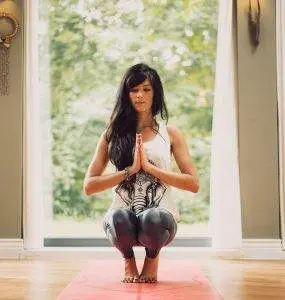
There are still a lot of taboos surrounding women’s health, and many girls and women have never learned how to take care of their reproductive health. Working with an experienced TCM doctor will enable you to get personalized care and advice about how to eat the best diet for PMS symptoms, what activities to avoid before your period, and other female hygiene tips that you may not have heard before.
- Nutrition – conventional Western thinking about healthy eating currently focuses on eating fresh, whole foods, which is good, except that people tend to think this means eating a lot of foods raw or cold, as in salads and smoothies. According to the TCM philosophy of nutrition, though, eating cold foods is actually one of the worst things you can do when it comes to relieving PMS and painful periods. Putting a lot of cold food into the stomach cools down the temperature of the other internal organs, which can contribute to more cramping and worse cramps. During the week before your period, concentrate on eating plenty of nourishing, cooked foods like soups and stews, proteins and vegetables, and whole grains like brown rice and quinoa. Avoid too much dairy, sugar, caffeine, hot, spicy or fried foods (that includes chips and crackers), and definitely avoid icy cold beverages and frozen treats.
- Keep track of your period – there are many apps available now to help with this, but it can also be a simple chart with room for notes about your symptoms. Keeping track of your PMS symptoms every month can help you recognize patterns in your own behaviors and experiences. A record of PMS symptoms will also help you communicate what you’re feeling to your health care providers when you are seeking treatment for PMS or PMDD.
- Exercise – gentle movement modalities that move Qi through the body are great to help PMS: Tai Qi, yoga, or dancing are all good. Avoid deep twists that could squeeze or put pressure on the ovaries and other organs. Again, keep track of your exercise routines and how they affect your physical and emotional wellbeing from month to month so that you can see which type of workout is best for you, or if some types of exercise make PMS worse.
Acupuncture Near Me for PMS in Los Angeles, CA
Many women come to us at Art of Wellness seeking help with menstrual problems or fertility issues. We have over 30 years of experience in helping to relieve symptoms of PMS and all types of period pain and dysfunction. It is possible for the menstrual cycle to flow without extreme feelings or strong physical discomfort. If you feel like PMS or PMDD is negatively impacting your life every month, please do not hesitate to give us a call.
*This article is for education from the perspective of Traditional Chinese Medicine only. The education provided by this article is not approved by FDA to diagnose, prevent, treat and cure human diseases. It should not stop you from consulting with your physician for your medical conditions. Traditional Chinese Medicine is based on Qi, which is an invisible force that usually cannot be observed by modern science. Because science focuses on testing ideas about the natural world with evidence obtained through observation, these aspects of acupuncture can’t be studied by science. Therefore acupuncture and Chinese herbs are often not supported by double-blind, randomized trials, and they are considered alternative medicine therapies in the United States.
How to Treat Tennis Elbow With Acupuncture and TCM
By Qineng Tan, L.Ac., Ph.D. & Xiaomei Cai, L.Ac., Ph.D.
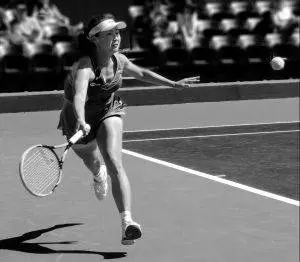
Pain in outer elbow or burning sensation in forearm? Tennis Elbow, also called lateral epicondylitis, is a pain condition caused by overuse or repetitive movements of the arm and wrist. Acupuncture and TCM can provide help with healing the muscles and tendons of the elbow and providing elbow pain relief of tennis elbow, golfer’s elbow, or tendonitis, so you can get back to your usual activities.
“Tennis elbow” gets its name from the fact that many people get this type of repetitive use injury from playing tennis and other sports that involve holding a racquet. But tennis elbow doesn’t only occur in athletes; it’s also common among people who have to perform repetitive movements that tax the muscles and tendons of the elbow, forearm, wrist, and hand and involve gripping an object, such as: painting, hammering and sawing (construction workers), cutting or chopping (cooks, chefs, butchers), using a wrench (plumbers), or working on an assembly line.
Tennis elbow is a kind of tendonitis, or inflammation of the soft tissues of the forearm. Tendonitis occurs when the soft tissues that attach muscles to bones sustain microtears and become inflamed. The major muscle involved in movements where the wrist and hand are gripping an object while the elbow is extending, or straightening, is the extensor carpi radialis brevis (ECRB) muscle. The ECRB muscle experiences friction as it moves over the bumpy joining of three bones in the elbow joint. Over time, and with overuse, the tendons that attach the ECRB to the bones can become torn and/or inflamed.
Tennis elbow pain is usually centered right in the outer side of the elbow, and just below the joint, but it can also radiate further down the arm and into the wrist. There might be a burning sensation in the muscle on the outer forearm. Pain and weakness in the elbow and wrist can make it difficult to perform regular actions like holding a cup or using a computer mouse.
Golfer’s elbow is a similar condition in that it is also an overuse injury that causes weakness and pain in the forearm. The difference is that with golfer’s elbow, also known as medial epicondylitis, the inflammation and microtearing occur in the muscles and tendons involved in flexing the arm rather than extending it, or bending the wrist inward towards the palm with a lot of force or speed. These are located on the inner part of the elbow and forearm. This type of repetitive use condition can be the result of swinging a golf club, throwing a baseball, hitting a forceful spin serve in tennis, but also such activities as shovelling, using a heavy tool like an axe or chainsaw, or even just carrying a heavy suitcase with your hand and wrist wrapped around the handle.
Tennis elbow pain can be resolved with rest, but for many people, complete rest is not a feasible or desirable option. Acupuncture treatment has been shown to help provide significant pain relief for tennis elbow. Acupuncture treatment can help to reduce inflammation and improve blood flow to injured areas to aid and speed healing of various types of tendonitis.
Top 5 Symptoms of Tennis Elbow
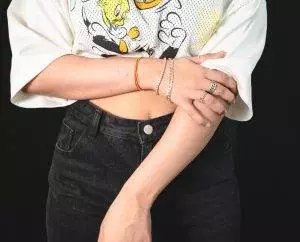
Signs of tennis elbow usually develop slowly over time and are not caused by any obvious single injury.
- Elbow pain or pain on the outside of the forearm, burning sensation in the outer part of elbow, stiff elbow
- Pain that radiates down to the wrist, wrist pain, stiff wrist
- Stiffness of the elbow, especially first thing in the morning
- Weak grip strength, reduced grip strength
- More severe pain when gripping an object, like a mug or racquet
Symptoms of golfer’s elbow are similar, except that the pain is located on the inner side of the elbow or forearm, as opposed to the outer side. Pain is more likely to radiate to the fourth and fifth fingers (ring finger and pinky finger) than to the wrist. You may feel pain when making a fist.
Wrist pain, tingling in the fingers, and weak grip strength can also be signs of carpal tunnel syndrome.
Medical Treatment for Tennis Elbow
The standard treatment for Tennis Elbow begins with rest, icing, and non-steroidal anti-inflammatory medications (NSAIDs like Ibuprofen or Acetaminophen) to reduce pain and swelling. If the pain persists, or perhaps if a person is not able to avoid the activities that are causing the inflammation, doctors may recommend wearing a brace and may administer steroid injections.
Surgical treatment for tennis elbow is relatively rare and only recommended in cases where rest and pain management medications are not working. An arthroscopic procedure to remove damaged and scarred tissue can help repair the muscles and tendons, but there is usually a long recovery time after the surgery.
A newer form of treatment for chronic tendon pain and inflammation is the F.A.S.T. procedure (Focused Aspiration of Scar Tissue). This is a less invasive procedure that uses ultrasound imaging and ultrasonic technology to remove tiny bits of damaged tissue without any incisions. Recovery time after this procedure is much shorter than with regular tennis elbow surgery.
While pharmacological treatment for pain may help to reduce immediate suffering, medications like NSAIDs and steroid injections come with significant side effects, even if they aren’t immediately apparent. Using these kinds of medications long-term to alleviate chronic pain can take their toll, sometimes causing gastrointestinal distress, weight gain, sleep problems, and other side effects that have a negative impact on overall health. Acupuncture treatment can act as an analgesic to relieve pain without any negative side effects. In fact, the side effects of acupuncture treatment are usually beneficial, including increased circulation, immune function, and stress relief.
Can Acupuncture Treat Tennis Elbow?
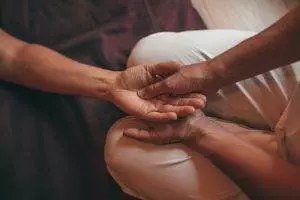
The treatment of chronic pain and inflammation with TCM goes back for many centuries. We use acupuncture and other methods to help relieve pain and reduce inflammation related to shoulder pain, knee pain, hip pain, neck pain, sprained ankle, and foot pain. TCM uses a variety of modalities to treat orthopedic pain conditions, including: acupuncture treatment, electro-acupuncture, moxibustion, cupping, Tui Na massage, exercise, and Chinese herbs in formulations for both internal (tea or pills) and external (pain patches) use. This multi-pronged approach can be very effective for reducing pain in the short term, while helping tissues to heal over time.
A controlled study in which patients suffering from lateral epicondylitis were divided into three groups and treated with either massage or acupuncture, or a combination of both, showed that patients who received the combination treatment experienced, for the most part, a complete recovery after twenty sessions.
Another controlled study that compared people suffering from chronic tennis elbow who were treated with real acupuncture versus sham acupuncture showed that at both the two week mark and the two month mark, people who had received acupuncture reported less pain and improved function of the arm joints.
Exercises and Pressure Points for Tennis Elbow Pain Prevention

If you are already experiencing tennis elbow pain or signs of golfer’s elbow, you may need to take some time off from sports or make accommodations to your work in order to rest the muscles and tendons of the forearm. Resting the arm is important for allowing inflammation to go down. Once you’re able to start exercising again, try these home remedies for tennis elbow that will help to prevent tendon problems in the future:
- To prevent repetitive stress conditions like tennis elbow and golfer’s elbow when playing sports, be sure to always warm up before playing and cool down afterwards. Practice your form, with a trainer if warranted, so that you know your technique is good and not contributing to pain or injury. Check your sports equipment regularly to make sure everything is in good condition and the right size and balance for you.
- Pressure points for tennis elbow: If you are experiencing pain in the elbow and forearm, you might try using this acupressure point to help tennis elbow pain: LI11 (Large Intestine Meridian 11) – located right in the crevice of the elbow crease, applying pressure to this point can help move Qi and blood through the joint and bring relief from tennis elbow pain. This point is also helpful for clearing heat and cooling you down after exercise, so it’s a good one to use right after a game or when you finish work.
- Exercises for Tennis Elbow – practicing gentle exercises that strengthen the muscles of the wrist and forearm can help prevent pain and tissue damage. Using light dumbbells or a flex bar can help with grip strength.
Acupuncture Near Me for Tennis Elbow on the Westside of Los Angeles
Whether you are an avid tennis player, or someone who works hard doing physical labor, elbow pain from lateral epicondylitis can really cramp your style. Athletes and active people of all ages need to take care of their bodies appropriately so as to avoid injuries that can lead to chronic pain. Adding acupuncture to your health regimen is a great way of providing basic maintenance for your body. Acupuncture treatment, therapeutic massage, and a good nutrition program can all help you keep your joints moving smoothly, without pain. At Art of Wellness, we have over 30 years of experience in helping to relieve orthopedic and musculoskeletal pain conditions.
*This article is for education from the perspective of Traditional Chinese Medicine only. The education provided by this article is not approved by FDA to diagnose, prevent, treat and cure human diseases. It should not stop you from consulting with your physician for your medical conditions. Traditional Chinese Medicine is based on Qi, which is an invisible force that usually cannot be observed by modern science. Because science focuses on testing ideas about the natural world with evidence obtained through observation, these aspects of acupuncture can’t be studied by science. Therefore acupuncture and Chinese herbs are often not supported by double-blind, randomized trials, and they are considered alternative medicine therapies in the United States.
How to Treat Toothaches With Acupuncture and TCM
By Qineng Tan, L.Ac., Ph.D. & Xiaomei Cai, L.Ac., Ph.D.
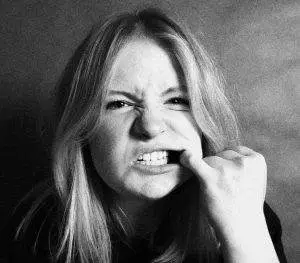
Sharp tooth pain, toothache, or throbbing pain in teeth usually means you need to see the dentist. The pain of dental work often necessitates the use of anesthetics, while post-operative pain from dental surgery is usually treated with over the counter pain medications or opioid painkillers. Acupuncture offers an alternative way of dealing with dental pain and can also relieve the dental anxiety many people experience when they have to have dental work done.
Oral pain makes it hard to eat, hard to talk, hard to even think straight. Mouth pain felt in relation to problems with the teeth, or a hurting tooth, is often nerve pain that may be sharp in one place, or radiate to other parts of your face and head. Acupuncture acts upon the neurotransmitters that carry signals between parts of the body and the brain, helping to block pain sensations and relieving tooth pain.
Different types of mouth pain, not necessarily related to dental problems or the teeth, can also be alleviated by acupuncture, including TMJ jaw pain, clicking or locking of the jaw, tension from grinding teeth, and dry mouth (xerostomia). Myofascial pain, pain in the muscles of the face, and migraines that cause pain in the neck and side of the head can also be helped with acupuncture treatment.
Acupuncture and herbs do not replace the need for regular dental visits or necessary dental procedures. However, TCM methods, used in conjunction with good oral hygiene, can help to promote the development of strong teeth in children, and the maintenance of healthy teeth and gums in adults. TCM treatments help improve immune function, as well, which can help prevent mouth infections.
While dentists have a variety of anesthetics they can use to help reduce pain during dental procedures, many people find the injection of anesthetic to be painful and anxiety-inducing in and of itself. There are definitely downsides to the pain relief offered during dental visits, so much so that many people avoid going to the dentist, or at the very least wish there was some alternative form of anesthesia. Recently, there is growing interest and research to show that acupuncture can be an effective means of providing pain relief before, during, and after dental procedures.
It is estimated that up to 30% of people report feeling dental anxiety, while about 10% of patients experience dental phobia. Acupuncture has been shown to help produce a clinically significant decrease in feelings of anxiety or fear of going to the dentist.
Managing Dental Pain
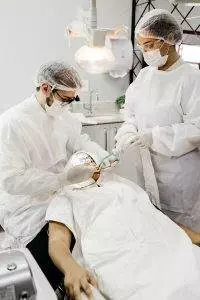
It is common to experience pain while you are waiting to get into the dentist for a toothache caused by a broken filling or because a crown has fallen out. Most dental pain is usually managed with non-steroidal inflammatory drugs (NSAIDs), also known as OTC pain medications like ibuprofen and acetaminophen. However, some people cannot tolerate the regular use of these medicines, as they can cause damage to the lining of the stomach.
Different types of anesthesia used during dental work include:
- local anesthetics (lidocaine, articaine, etc.), which numb the area where a tooth is being worked on
- sedation (nitrous oxide gas, Valium, Versed, etc.), which helps relax the patient
- general anesthesia, which means a patient is rendered unconscious for the duration of the dental procedure
Pain after oral surgery is most often treated with over the counter analgesics like ibuprofen or acetaminophen, but severe dental pain may be treated with opioid painkillers. Dentists in the U.S. are far more likely to prescribe opioid pain medications than they do in other countries. Dentists are also more likely to prescribe long-acting opioids, and to prescribe opioids for a longer period of time. The growing numbers of people addicted to opioids in America is largely due to over-prescription of these drugs. TCM methods like acupuncture can relieve a toothache and reduce post-operative pain and bleeding without side effects or risk of dependence.
Can Acupuncture Help Tooth Pain?
Acupuncture treatment has an analgesic effect, reducing pain and inflammation of all kinds. Acupuncture not only offers natural pain relief for toothache, but can also help reduce bleeding during dental procedures such as tooth extractions.
A controlled study that compared two groups of patients have teeth extracted, one group treated with articaine hydrochloride injections and the other groups treated with acupuncture needles, found that pain relief was comparable between the anesthesia and acupuncture groups, while bleeding was less amongst those patients given acupuncture.
In addition to helping with pain and bleeding during and after a dental procedure, many people find it helpful to come in and have an acupuncture treatment just prior to their dental appointment in order to help alleviate anxiety. Acupuncture may also help to reduce a person’s gag reflex, which can be easily triggered during fittings for orthodontic devices, or impressions.
With acupuncture treatment, we can also effectively treat dental anxiety, allowing for patients to feel more relaxed going into their dental appointment and feel less pain during and after a dental procedure.
Top 3 Pressure Points to Help Tooth Pain
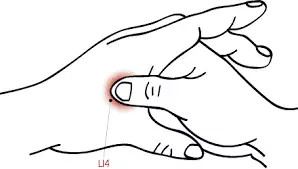
Acupressure has been shown to help reduce anxiety, gag reflex, and the need for dental injections for pain during fittings for prosthetics. Specific points on the head and face, in particular, can help relieve toothache and swelling.
If you are experiencing acute tooth pain, plan to see your dentist as soon as possible. In the meantime, using these acupressure points for toothaches can help you stay calm and alleviate the pain until you can get treatment.
- ST6, Stomach Meridian Point 6, is located in the cheek, equidistant between the corner of the mouth and the earlobe. Apply pressure to the jaw muscle here to help relieve toothache and jaw pain.
- SI18, Small Intestine Meridian Point 18, is right in the cheek hollow, perpendicular to the corner of the eye and outside of the nose. Apply pressure to this point to help relieve tooth pain and swollen gums.
- LI4, Large Intestine Meridian Point 4, is located in the webbing between the thumb and index finger. Squeeze with firm pressure here. Often used to relieve headaches, but this point helps tooth pain, as well.
Acupuncture Near Me for Tooth Pain on the Westside of Los Angeles
No one likes going to the dentist. However, if you have a hurting tooth but you’ve been avoiding the dentist out of fear, or if you know you have to have some major work done, and you are dreading it, please consider scheduling an acupuncture appointment before your next dentist appointment. Discover for yourself how acupuncture can help relieve dental anxiety and post-procedural dental pain. You may find you feel much more relaxed about the whole thing, and herbs and acupuncture can help staunch bleeding and speed recovery after dental work.
*This article is for education from the perspective of Traditional Chinese Medicine only. The education provided by this article is not approved by FDA to diagnose, prevent, treat and cure human diseases. It should not stop you from consulting with your physician for your medical conditions. Traditional Chinese Medicine is based on Qi, which is an invisible force that usually cannot be observed by modern science. Because science focuses on testing ideas about the natural world with evidence obtained through observation, these aspects of acupuncture can’t be studied by science. Therefore acupuncture and Chinese herbs are often not supported by double-blind, randomized trials, and they are considered alternative medicine therapies in the United States.
How to Treat UTI With Acupuncture and TCM
By Qineng Tan, L.Ac., Ph.D. & Xiaomei Cai, L.Ac., Ph.D.
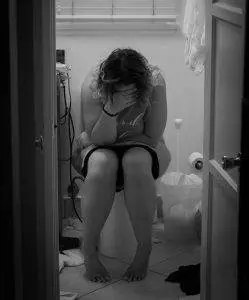
Why do I feel like I have to pee all the time? A urinary tract infection, usually referred to as UTI, is a bacterial infection that affects the bladder and/or other parts of the urinary system, causing urinary urgency, often accompanied by a burning pain when you go to the bathroom. Acupuncture and TCM is a good way to get to the root causes of frequent urination, including recurrent UTIs.
Urinary frequency, or an unusual urgency to urinate, can be caused by several different health conditions. A common cause of bladder pain, pressure on the bladder, or a burning sensation when peeing is a bacterial infection in the urinary tract, or UTI. But there can be many other reasons for constantly feeling like you have to pee, including diabetes, interstitial cystitis (IC), pregnancy, prostate problems, ovarian cysts, and more.
Over half of all adult women have experienced a UTI (also called cystitis) at some point in their lives. Many women get UTIs frequently, making them the most common type of non-hospital-related infection in the U.S. Up to 6% of all doctor visits are related to UTIs. A UTI can occur when bacteria, usually E. coli, gets into the urethra and travels up into the bladder, or further into the urinary tract. This can happen because of hygiene habits, after sex or exercising, or the use of contraceptives or period products. It can also happen when urine sits in the bladder for too long, or because a person has a weakened immune system.
While UTI treatment at home remedies such as drinking cranberry juice are popular, most women recognize that once they get that constant urge to pee, they have no choice but to rush to the doctor for antibiotics. Typical UTI medical treatment almost always involves confirming the infection by lab analysis, and a prescribed course of antibiotics, along with analgesic medicine (such as Pyridium) to help the UTI pain in bladder. Unfortunately, many women keep getting UTIs. Infections that are antibiotic resistant are increasingly common, and antibiotics do not get to the root of the problem.
Interstitial cystitis (IC), or painful bladder syndrome, is a condition that causes a constant sensation of having to pee, or bladder pressure, even when there is no infection present. Recurrent UTI and IC are a significant source of anxiety and depression for women, as they can cause almost constant pain and an inability to leave the house due to the constant urge to urinate.
UTI in men is not as common as UTI in women. The more common cause of frequent urination in men is benign prostatic hyperplasia (BPH), in which an enlarged prostate presses on the urinary organs, blocking the flow of urine, and causing backup that can lead to bacterial urinary tract infection men.
Sometimes what feels like a UTI might be something else. Growths in the pelvic area, such as ovarian cysts, uterine fibroids, or tumors can cause pressure in the bladder, bladder pain, or urinary frequency at night. Even when there is no infection, there may urinary symptoms such as:
- Strong urge to pee frequently (more than 8 times per day)
- Difficulty urinating
- Urine is different color than usual
- Pain during peeing, or burning sensation when peeing
- Nocturia, frequent urination at night
The conventional medicine answer to UTI is antibiotic treatment, but this is not the only answer for everyone. TCM methods of acupuncture and herbs can help with improving the function of bladder and kidney systems, reducing symptoms from recurrent UTIs, as well as helping to address the deeper problems that cause inflammation and pressure in the bladder.
Top 10 Urinary Frequency Causes
There are many possible causes of frequent urination.
- UTI (urinary tract infection, also called cystitis, or bladder infection)
- Kidney infection – when bacteria move further up into the urinary tract, the kidneys can become infected. Sometimes people with nerve damage in the spine cannot feel UTI symptoms (neurogenic bladder), so the infection becomes more widespread.
- Bladder stones – when the bladder does not empty completely, urine can crystallize and form hard stones, causing pain during urination.
- Interstitial cystitis (painful bladder syndrome) – a syndrome of urinary pain symptoms, the exact cause of which is unknown. Inflammation of the bladder lining may be due to trauma (from surgery or delivery/birth), overdistension, or dysfunction of the pelvic floor muscles.
- Prostatitis – inflammation of the prostate accompanied by irritation of the nerves in the area; not necessarily an infection, although a bacterial infection of the prostate can occur.
- Urinary incontinence – leakage of urine, occurs when the urethral sphincter that controls the flow and stoppage of urine is weak. More common in women and older people.
- Vaginitis – inflammation of the vagina, usually due to infection. Candida, or yeast infection, is one type of vaginitis.
- Diabetes – can cause a variety of urinary problems, due to the body producing more urine to process blood sugar, and nerve damage that leads to urinary retention and incontinence. Constant thirst is also a sign of diabetic urinary symptoms.
- Side effects of cancer treatment in pelvic area – cancer treatments that affect the pelvis, including radiation, chemotherapy, immunotherapy, and surgeries to remove pelvic organs, can all cause irritation or damage to the bladder.
- Overactive bladder (OAB) – a group of symptoms, including frequent urination, leakage, nocturia (getting up to pee at night), and primarily, a strong urge to urinate often. Considered to be caused by inappropriate signalling of the nerves that communicate between the brain and the urinary tract organs.
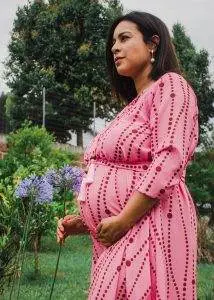
Causes of frequent urination vary somewhat according to biological sex. Frequent urination in men is often caused by prostate problems, while frequent urination in women may be due to pregnancy or other womens’ health conditions related to the ovaries or uterus.
Pressure on the bladder because of pregnancy, or from other organs, can also cause urinary frequency and discomfort. This can happen due to an anterior prolapse, when the pelvic floor is weakened, and the uterus, intestine, or bladder drop from their normal position. When a woman is pregnant, the heavy uterus often causes more frequent urination, or, in some cases, urinary retention. Damage or trauma to the pelvic floor can occur during delivery, so many women experience weak pelvic floor muscles, prolapsed uterus or bladder, and ongoing urinary urgency after they have had a baby.
In men, an enlarged prostate or prostatitis (infection and inflammation of the prostate) can put pressure on the bladder and other parts of the urinary system.
A frequent need to pee can also be caused by drinking too much coffee or alcohol, or taking diuretics.
Can Acupuncture Help Frequent Urination?
In Chinese Medicine, urinary problems come under the classification of “Lin Syndromes.” Lin disorders generally involve painful, “dribbling” urination and are caused by disharmonies in the Bladder and Kidneys, as well as involving other major organs like the Heart, Liver, and Spleen. Dampness and Heat are the primary pathogenic factors, so we use acupuncture treatment and herbal formulations to clear heat and dampness from the body.
Top 5 TCM differentiations of UTI:
- Damp Heat – characterized by frequent urination, burning sensation when peeing, painful pressure in bladder, dark urine or cloudy urine that smells unusual, feelings of nausea, bitter taste in mouth
- Heart Fire – frequency and urgency, thirst, hot, red face and chest, trouble sleeping/insomnia, irritability, anxiety, heart palpitations
- Liver Fire – excess heat causes painful burning during urination, headaches, ringing in ears/tinnitus, constipation, feelings of anger and frustration, redness in eyes and face.
- Fatigue Lin – covers urinary disorders that involve incomplete emptying of the bladder, due to prostate enlargement or prolapsed pelvic organs.
- Stone Lin – obstructions of the urinary system due to buildup of minerals that create stones in the bladder, kidney stones, etc.
Patients who have problems with recurring UTIs may be resistant to the antibiotics they’ve been given. TCM herbs can be used as an additional or alternative remedy from antibiotics and help to strengthen the immune system overall. One review of studies involving the use of Chinese herbal medicine (CHM) for UTIs concluded that the herbs, whether used alone or in conjunction with antibiotics, worked better than antibiotics alone.
One study showed that women who were prone to getting UTIs who were treated with acupuncture as preventative care only got a UTI one-third as often as women who didn’t receive acupuncture. Acupuncture has also been shown to be highly effective for bladder pain due to interstitial cystitis. Studies have also shown that TCM treatment can relieve the blockage of urine caused by an enlarged prostate (BPH).
Top 5 Tips for Preventing UTI

What a relief! Now that you’ve gotten over that urinary tract infection, it’s important to take steps to prevent getting another UTI. Here are some natural ways to prevent UTIs:
- Drink more water – This may seem counterintuitive, as you don’t want to have to pee even more. But you do want to be constantly flushing bacteria out of the urinary tract. Avoid drinks like coffee and soda, which can be irritating to the bladder.
- Go when you feel you need to – Some therapies for overactive bladder or IC involve training yourself to hold urine, but for most people, this is not a good idea. Retaining urine for too long contributes to bacterial growth and causes overdistension of the bladder.
- Hygiene – be sure to wipe from front to back when you go to the bathroom. Change clothes and underwear often, especially after sweating. During your menstrual period, change your pad and tampon frequently.
- After sex – always go to the bathroom and urinate before falling asleep.
- Avoid chemical products – Avoid using deodorants, douches, or scented wipes around the genital area. Consider whether contraceptive products like spermicides might also be part of the problem.
Acupuncture Near Me for UTI
While it is rare for a UTI to become so serious that you have a fever or become nauseated, urinary problems should be taken seriously before they become worse. If your UTIs keep coming back, or you constantly feel like you have to pee, it may be a sign that there is something deeper going on. As people age, urge incontinence, prolapsed organs due to weak pelvic floor muscles, and nerve damage can lead to more serious bladder problems. TCM provides a holistic way to treat urinary tract issues, as well as other, possibly hidden conditions in the pelvic region. Urinary urgency may be a signal of something else, so don’t ignore it. Consult with your acupuncturist to find urinary frequency relief.
*This article is for education from the perspective of Traditional Chinese Medicine only. The education provided by this article is not approved by FDA to diagnose, prevent, treat and cure human diseases. It should not stop you from consulting with your physician for your medical conditions. Traditional Chinese Medicine is based on Qi, which is an invisible force that usually cannot be observed by modern science. Because science focuses on testing ideas about the natural world with evidence obtained through observation, these aspects of acupuncture can’t be studied by science. Therefore acupuncture and Chinese herbs are often not supported by double-blind, randomized trials, and they are considered alternative medicine therapies in the United States.
The Ultimate Guide to the Acupuncture Point on Head for Headaches
by Xiaomei Cai, L.Ac., Ph.D. & Qineng Tan, L.Ac., Ph.D.
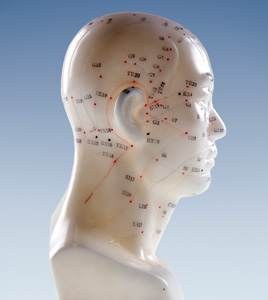
Why does the TCM doctor always put an acupuncture needle in top of head? If you’ve had acupuncture before, it’s likely that your acupuncturist used some acupuncture points on head during your treatments. Using pressure points on the head is something TCM doctors do often, because there are so many useful acupressure points on the head, especially acupuncture points top of head. There are head pressure points for headaches, points to relieve migraines, acupressure head points to help anxiety, fatigue, allergies, and many other conditions.
Even if you’re coming in for acupuncture to help some other condition, whether it’s chronic pain, an autoimmune disease, heart problems, or kidney problems, probably at some point your acupuncture practitioner is going to use acupoints on head to help you relax during your treatment. Every single person who comes into our office for acupuncture is suffering from some form of stress, and using certain points on the top of the head can help with stress relief right away.
Other common reasons to use pressure points in neck and head include:
- to fight fatigue
- headache and migraine
- allergies, asthma, hives, rhinitis, sinus problems, common cold
- anxiety
- nervous disorders
- thyroid disorders
- hormone imbalances
- more mental focus, improved memory and cognition
- tinnitus, ringing in the ears
- vertigo, Meniere’s disease
- toothache, dental pain, dental anxiety
Why are pressure points on the head so powerful? To answer this question, let us explain a bit about the meridian system in TCM.
TCM Meridian Head Points
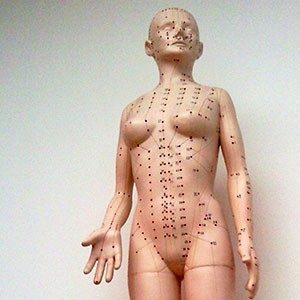
TCM is based on interdependent systems of organs and energy channels that run through the body. The channels are known as meridians, and along them flows Qi, the life energy that animates the body and all of its functions. There are 12 major meridians and 8 major vessels; the meridians are close to the surface of the skin, and the vessels, which essentially connect all the meridians, are deeper inside the body. While the way in which we think of the meridian pathways is more metaphorical than physical in nature, they can be considered roughly analogous to the circulatory system of blood vessels or the network of nerves of the nervous system as we think of them in conventional Western medicine.
Along the meridians lie acupoints, specific points that we stimulate with acupuncture needles during acupuncture treatment or with the fingers and thumbs during acupressure massage. The interconnectedness of the organs, meridians, and individual points is the foundation of acupuncture theory.
We use specific points on a meridian in order to address issues in a particular organ or organ system that corresponds (energetically) with that meridian. There are several pressure points for head and neck pain, points to help relieve allergies, pressure points for frontal headache, and more.
Several of the major meridians originate or end in the head:
- Gall Bladder (GB) meridian – points of the gall bladder meridian wrap around the side of the head, the forehead above the eyebrow, the temple, around the ear, and down the back side of the neck–just as the pain of a migraine often does. Then it continues down from the intersection of the neck and shoulder, zig-zagging across the torso, and finally running down the leg and ending in the fourth toe. This meridian is used to treat severe headaches, stress, tension that affects the shoulder and neck, and bile-related problems.
- Large Intestine (LI) meridian – begins at the points of the index finger, travels up the arm, through the shoulder and neck, then comes up to the lower corner of the nose. This meridian is involved in “letting go,” both from the eliminatory organs of the lower body, and exhalations from the nose.
- Stomach (ST) meridian – the ST meridian starts near the eye, swoops up to the side of the top of the head, comes down next to the mouth, and continues down through the neck, chest, center of the body, down the leg, ending at the point of the second toe. This meridian is used to treat Shen (spirit) disorders, like insomnia, anxiety, palpitations, memory problems, and blood deficiency.
- Small intestine (SI) meridian – originates in the little finger, runs up the arm into the shoulder and then branches out, some of it going into the major organs of the heart, stomach, and small intestine; then other branches go up into the face, by the cheekbone and right in front of the center of the ear. The SI is used to treat fevers and mental health conditions, among other things.
- Bladder (UB) Meridian – begins at the inner canthus of the eyes, goes up and over the top of the head, about an inch away from the midline on either side, and then all the way down the back and leg, ending in the little toe. Used to help with invasion disorders (wind, cold, heat etc.) that affect the eyes, sinus headaches, allergies, stuffy head, neck pain and stiffness.
- Triple burner meridian, also known as San Jiao (SJ) – begins at the tip of the ring finger, then goes up the arm, through the shoulder and chest, up the side of the neck and comes up around the ear, and into the temple and outer brow bone. The San Jiao head points are used to work on dizziness, headaches, eye twitching, and dental pain.
- Conception vessel – also known as the Functional Channel, or the Front Channel, or Ren Mai, this vessel originates at the navel, then drops down to the perineal area, and runs back up the center of the front of the body, ending in a point on the chin, in the dip just under the lower lip. This vessel controls the Yin energy of the body and is essential to the health of the reproductive organs and fertility.
- Governing vessel, also known as the Extraordinary vessel, the “Sea of Yang” or Du Mai – originates in the lower back near the kidneys, runs up the spine and around and over the top of the head, ending in the middle of the face. This vessel controls the Yang energy of the body, and in particular the kidneys, the back and spine.
Top 10 Acupuncture Points on Head
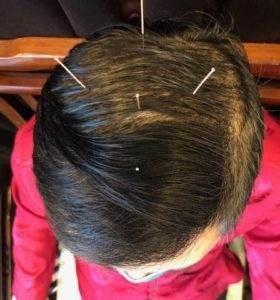
Of course, your acupuncturist will not only use acupoints on your head during a treatment session. We choose a variety of points that will work together to alleviate symptoms and help optimize the functioning of the organs. These specific head points may be used as part of a treatment to work on a specific symptom or condition:
- Yin Tang, or the “Hall of Impression” – this is what is called an “extraordinary point,” meaning it doesn’t really belong to a meridian; it stands on its own. Right in the third eye, it is used to reduce anxiety, vertigo (dizziness), help promote better sleep, clear wind and congestion, and relieve sinus pain and headache.
- DU21 – Shen Ting, “Spirit Court” – Right in the front middle of the top of the head, about an inch above the hairline. This is one of the pressure points for frontal headache, also good for sinusitis, nosebleeds, anxiety, panic attacks, and sleep problems.
- DU 20 – Baihui, or “The meeting of the 100s” – right in the very center of the top of the head, master of endocrine and nervous system, used for anxiety, fatigue, mental focus, relaxation, hypothyroid, adrenal problems, hormone imbalance, headaches.
- Si Shen Chong – “Four Alert Spirit” – this is actually a set of four “extraordinary points,” which surround DU20. Very helpful for sleep disorders, memory disorders, dizziness, and headaches.
- GB20 – Feng Chi, “Wind Pool,” low back of the head, where the skull meets the neck muscles, helps headaches, migraine, blurred vision, fatigue, neck pain and stiffness. We may use this point when a patient has a cold; this is a point where cold wind can get into the body, and why it is important to wear a scarf to protect your neck when it’s cold and windy out.
- Taiyang “Great Sun” – Right in the depression of the temple, this point can help dizziness, one-sided headaches, migraines, sensitivity to light, and jaw pain, TMJ.
- GV26 Shui Gou – in the mustache area, between the nose and mouth, right in the center of the crease, this point helps to calm the mind and restore mental focus. Also used as first aid when a person faints or is in shock. Helps stop hiccups. Helps with serious neurological disorders like epilepsy, seizures. Also good for low back strain.
- LI20 Ying Xiang “Welcome Fragrance” – located in the lower corner of the nose, right in the nasolabial groove, used to alleviate congestion, allergy itching in the nose, and to clear the nasal passages.
- ST8 – Touwei, about 5 finger widths above the eyebrow, dispels dampness, used for “splitting headaches,” frontal headache, migraines, headache with nausea and/or vomiting, vision problems, tearing eyes, eye twitching, dizziness/vertigo, hair loss. Helps with mental health, when a person is “overthinking” things, or having repetitive thoughts.
- BL2 – Zhanzhu – located at the inner corner of the eyebrow, good for itchy, watery eyes due to allergies, other eyes problems like glaucoma, night blindness, and sinus headache.
Facial Acupuncture Points
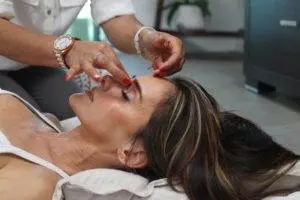
As we have mentioned, some pressure points on the face are used to help relieve sinus congestion, nasal congestion, and other issues related to common colds and flus or allergies. Points on the face may also be used to help the facial paralysis of Bell’s Palsy, or TMJ jaw pain.
Naturally, we also use acupuncture points on the face as acupuncture points for the face, that is, when we are striving for facial rejuvenation. This technique is sometimes called an acupuncture facial. Using points on the face can help to stimulate collagen production, help to tighten the skin, reduce the appearance of wrinkles, and strengthen the facial muscles. People of all ages and genders can benefit from acupuncture skin care. Cosmetic acupuncture can treat signs of aging skin like sagging, puffiness under the eyes, and dryness.
Self-Care With Acupressure Head Points
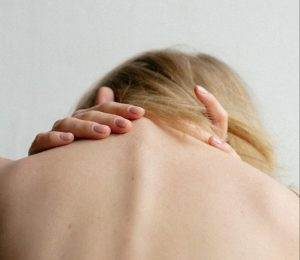
What is acupressure? Acupressure is a form of massage that goes back thousands of years in Chinese Medicine. Stimulating the same points we needle in acupuncture treatment with your fingers and thumbs can be beneficial for different types of headaches and neck stiffness, to calm anxiety, and bring more mental clarity.
Choose a time when your environment is quiet and free of distractions, the same as you would for a meditation practice or home workout. Be sure to breathe deeply and smoothly as you perform self-acupressure. Press firmly, applying deep pressure to a point in a small, gentle circular motion. Giving yourself an acupressure treatment only takes a few minutes, and it is a great way to take care of yourself between acupuncture sessions.
Acupuncture Near Me for Headaches and More
Every time you come in for acupuncture treatment, your TCM doctor is looking for ways to treat your overall condition, but also focusing on how you are feeling right now, today. Often, people are feeling tired and stressed, beyond and in addition to the health condition that caused them to seek out alternative medicine in the first place. Using points on the head that help fatigue, calm a racing mind, and reduce the physical effects of stress is one way that your acupuncturist is practicing preventative care, while at the same time, making sure you leave your treatment feeling rested and reenergized. The next time you come in for a visit, be sure to let us know how you’re feeling, and feel free to ask us, “What is that point on my head for?”
*This article is for education from the perspective of Traditional Chinese Medicine only. The education provided by this article is not approved by FDA to diagnose, prevent, treat and cure human diseases. It should not stop you from consulting with your physician for your medical conditions. Traditional Chinese Medicine is based on Qi, which is an invisible force that usually cannot be observed by modern science. Because science focuses on testing ideas about the natural world with evidence obtained through observation, these aspects of acupuncture can’t be studied by science. Therefore acupuncture and Chinese herbs are often not supported by double-blind, randomized trials, and they are considered alternative medicine therapies in the United States.